FAMILY: A Jockey Club Initiative for a Harmonious Society Using Information and Communication Technologies and Family Well-Being in Hong Kong Press Conference
HKU advocates “Quality Face-to-face Communication” to improve Family Harmony
*adapted from the contents published by the Li Ka Shing Faculty of Medicine, The University of Hong Kong at http://www.med.hku.hk/v1/archives/13368
With the advancement in technology, more and more people tend to communicate with their family members through Information and Communication Technologies (“ICT”). The FAMILY: A Jockey Club Initiative for a Harmonious Society (“FAMILY Project”), a collaboration project between The Hong Kong Jockey Club Charities Trust and the School of Public Health, Li Ka Shing Faculty of Medicine, The University of Hong Kong has conducted surveys on communication and family well-being in Hong Kong and announces the survey results today. During the press conference, “Quality Face-to-face Communication” is advocated to encourage the public to adopt face-to-face communication with their family members; to express gratitude and appreciation by positive words and actions; and to spend more time with family and practice “Zero Time Exercise” together, in order to enhance FAMILY Health, Happiness and Harmony (“3Hs”).
The survey findings are from FAMILY Project Hong Kong Family and Health Information Trends Survey (“HK-FHInTS”) and FAMILY Project Cohort Study.
Speakers of the press conference include Mr. Leong Cheung, Executive Director, Charities and Community, The Hong Kong Jockey Club; Professor Lam Tai Hing, BBS, JP, Principal Investigator, FAMILY Project; and Chair Professor of School of Public Health, Li Ka Shing Faculty of Medicine, The University of Hong Kong; Professor K. Viswanath, Professor of Health Communication, Harvard T.H. Chan School of Public Health; and Dr. Wang Man Ping, Kelvin, Assistant Professor, School of Nursing, Li Ka Shing Faculty of Medicine, The University of Hong Kong.
Mr. Leong Cheung, Executive Director, Charities and Community, The Hong Kong Jockey Club, said the growing popularity of smartphones had created a tendency for family members to communicate through instant messaging instead of face-to-face chats. “Not only the younger generation but also more seniors are now doing this, which is affecting both personal and wider family relationships,” he observed. “The Club has long been supporting initiatives to promote family harmony as we believe that a harmonious society starts from the foundation of a harmonious family. We hope the FAMILY Project can have a positive influence both on individual families in Hong Kong and ultimately, our entire society.”
Professor K. Viswanath commented that the collection of studies from the FAMILY Project are innovative and cutting edge offering some key insights on family communication dynamics in Hong Kong and how they contribute to family well-being. They offer useful pointers for intervention to promote family well-being through communication platforms. In addition, the measures and methods used in these studies also offer important models for studying such patterns in other countries.
Advocacy of “Quality Face-to-face Communication” to Enhance Family Harmony
In connection with the close association of face-to-face communication with FAMILY Health, Happiness and Harmony, Professor Lam Tai Hing said that, “The FAMILY Project team advocates the ‘Quality Face-to-face Communication’ through promoting the use of face-to-face communication, the adoption of positive words and actions, as well as expressing gratitude and appreciation towards family members. We must spend more time with family members. We and our family can do ‘Zero Time Exercise’ together, which enhances FAMILY Health, Happiness and Harmony, and also relieves musculo-skeletal and other health problems resulting from prolonged use of communication tools in smartphones and sitting for too long.”
Survey Background
FAMILY Project commissioned Public Opinion Programme (POP) of The University of Hong Kong to conduct the Hong Kong Family and Health Information Trends Survey. It was conducted during October to December 2013, in which 1,502 Hong Kong residents aged 18 or above who speak Cantonese were successfully interviewed through random telephone survey. For FAMILY Project Cohort Study, FAMILY Project commissioned MOV Data Collection Center Limited (MOV) to conduct the survey. The baseline household survey was conducted from March 2009 to April 2011 with 20,279 families (46,001 individuals) interviewed. Both the surveys aimed at understanding the relationships between Hong Kong family communication methods, family activities and family relationship, as well as indices of FAMILY Health, Happiness and Harmony (3Hs).
Findings on Family Communication Methods
•Three major communication methods adopted by Hong Kong families:
- Over 90 percent (94.8%) respondents frequently used face-to-face communication, followed by phone communication (78.1%) and instant messaging (e.g. WhatsApp and WeChat) (53.6%).
•Females more frequently used instant messaging:
- 60 percent (59.7%) female respondents frequently used instant messaging to communicate with their family members, which was more than male respondents (51.7%).
•People aged 18-44 more frequently used instant messaging and social media, comparing with those aged 45 or above:
- Instant messaging:
18-24 age group: 66.7%; 25-34 age group: 68.6%;
35-44 age group: 70.4%; 45-54 age group: 62.6%;
55-64 age group: 43.4%; 65 or above age group: 14.7%.
- Social media:
18-24 age group: 17.5%; 25-34 age group: 30.1%;
35-44 age group: 22.7%; 45-54 age group: 15.6%;
55-64 age group: 13.3%; 65 or above age group: 5.3%.
Findings on Family Communication, Activities and Harmony
•People who spent more time with their families on various activities reported better family harmony.
•Face-to-face communication was positively associated with Family Health, Family Happiness and Family Harmony (3Hs), whereas ICT had no significant associations with 3Hs.
•People who did at least 10 minutes moderate-intensity physical activity spent more time to communicate with family.
Put Emoticons into Actions
Do not just use emoticons to express gratitude and appreciation, and then do nothing afterwards. Put emoticons into real face-to-face words and actions. For example, put “Thank You”, “Like”, and “Clapping Hands” emoticons into actions, and add your own positive words to increase positive family communication.
Positive Words
Express Gratitude
- Thanks very much!
- Thanks very much for your hard work!
- Thank you (for the dinner. It was very delicious)!
Appreciation
- I appreciate your hard work!
- I admire your strength. You have used it well!
Sharing
- Let me tell you something: I met a nice person today…
- I want to share with you a happy event that happened!
- When I think of my family together (doing exercises), it brings a lot of joy and happiness!
- Let’s celebrate together… [even small good things should be celebrated]
- Let’s celebrate FAMILY Day after Mother’s Day!
Zero Time Exercise
“Zero Time Exercise” refers to exercises that do not require extra time, money and equipment. The exercises can be done Anytime, Anywhere, and by Anybody (3A). It is also Enjoyable, Easy, and Effective (3E). Many simple exercises under the concept of “Zero Time Exercise” are most suitable for family members to do together to burn more energy, strengthen muscles, enhance cardiovascular functions, relieve stress and promote mental health.
About FAMILY: A Jockey Club Initiative for a Harmonious Society
To help build a more harmonious society, The Hong Kong Jockey Club Charities Trust invited the School of Public Health, Li Ka Shing Faculty of Medicine, The University of Hong Kong to collaboratively launch a project entitled “FAMILY: A Jockey Club Initiative for a Harmonious Society” with a HK$250 million funding. The project aims to identify the sources of family problems, devise, implement and evaluate suitable preventive measures and promote FAMILY Health, Happiness and Harmony (3Hs) through a territory-wide prospective household survey, intervention projects and public education.
FAMILY Project:
Website: https://www.family.org.hk
YouTube: https://www.youtube.com/user/familyhk3h
Facebook: https://www.facebook.com/familyhk3h
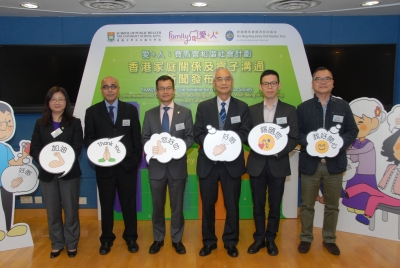
All guests and speakers took photo with positive words for promoting “Quality Face-to-face Communication” and FAMILY Health, Happiness and Harmony.
From left: Ms. Imelda Chan, Executive Manager, Charities, The Hong Kong Jockey Club; Professor K. Viswanath, Professor of Health Communication, Harvard T.H. Chan School of Public Health; Mr. Leong Cheung, Executive Director, Charities and Community, The Hong Kong Jockey Club; Professor Lam Tai Hing, BBS, JP, Principal Investigator, FAMILY Project; and Chair Professor of School of Public Health, Li Ka Shing Faculty of Medicine, The University of Hong Kong, Dr. Wang Man Ping, Kelvin, Assistant Professor, School of Nursing, Li Ka Shing Faculty of Medicine, The University of Hong Kong; and Mr. Joseph Leung, Volunteer, Community Health Campaign: Fitter Families Project, and Christian Family Service Centre.
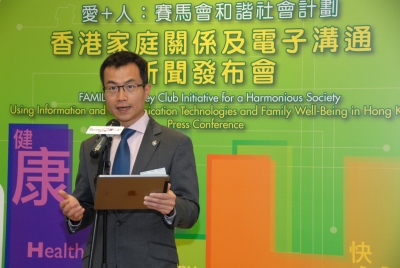
Mr. Leong Cheung, Executive Director, Charities and Community, The Hong Kong Jockey Club said that The Hong Kong Jockey Club hopes the FAMILY Project can have a positive influence both on individual families in Hong Kong and ultimately, our entire society.
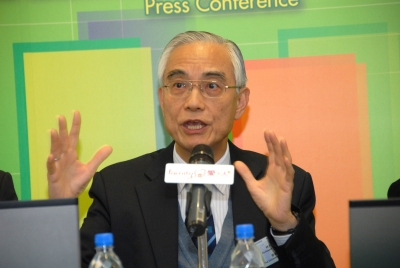
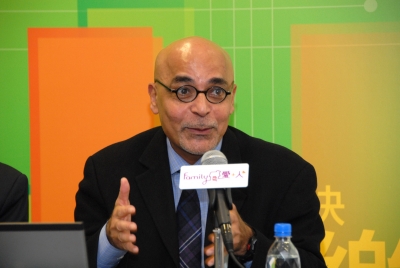
Professor K. Viswanath, Professor of Health Communication, Harvard T.H. Chan School of Public Health commented that the collection of studies from the FAMILY Project offers some key insights on family communication dynamics in Hong Kong and how they contribute to family well-being.


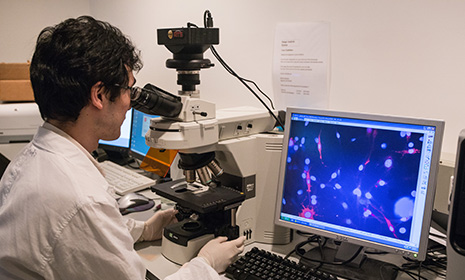





.png)
